Vietnam


1. Activities (2010- )
| Month/ Year | Places (Prefecture, etc.) | Activities |
| 2024/11/26 | Tsukuba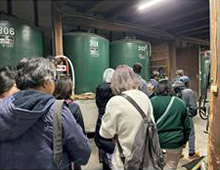 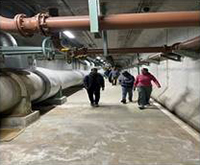 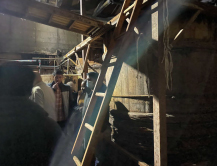 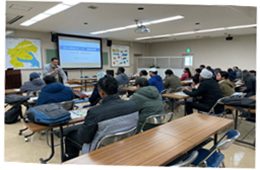 |
The participants visited a water treatment plant, a sake brewery, and a soy sauce brewery in the Kasumigaura Lake region to explore the potential of biotechnology in advancing a sustainable society. During the internship, they learned how biological processes are applied and managed. They also gained insight into agrotourism by studying the rich history of sake and soy sauce fermentation, discovering how these traditions are deeply intertwined with Japanese culture and Have contributed to the local community. |
| 2024/08/10-08/14 | Shanghai (China)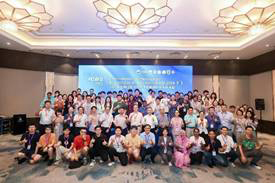 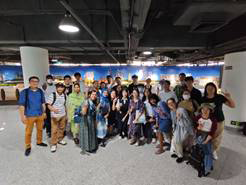 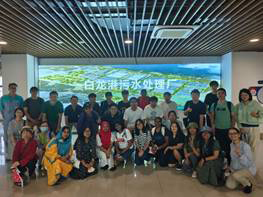 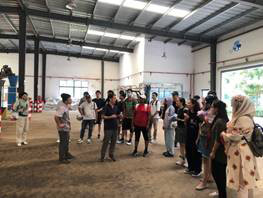 |
From August 10 to 11, the students attended the International Conference on Bioprocess and Sustainability 2024 (ICBS2024) organized by Shanghai Academy of Environmental Sciences, Tongji University, Shanghai University, Tsinghua University, Nankai University, Hainan University and University of Tsukuba. In this conference the students had a good communication with the 18 invited professors and about 300 participants on the advancements of biological processes and their contributions to sustainable development goals (SDGs). In the following three days, the students firstly visited Shanghai Mengqing Theme Park where they acquired the history of water pollution, sewage collection, and management in Shanghai. During the visit to Shanghai Bailonggang Wastewater Treatment Plant (WWTP), the largest WWTP in Asia, the students learned how this largest WWTP treats about one-third of the sewage and sludge produced in Shanghai and gradually improves its sustainability. In Shanghai Qingpu Agricultural Park, they deeply understood how the local farmers environmentally friendly manage their farmland including irrigation system and agricultural wastes with improved crop productivity and quality in the context of SDGs. |
| 2024/07/30-08/01 | Tohoku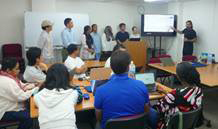 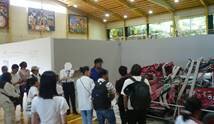 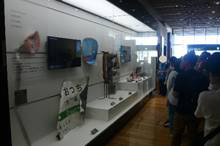 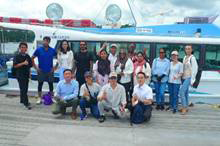 |
The participants visited disaster remains and museums in Miyagi and Iwate Prefectures to learn about the actual damage caused by the earthquake and tsunami of the Great East Japan Earthquake. The participants visited the Matsushima Coast and learned about the importance of tourism resources in the recovery process. Furthermore, they learned about the differences in disaster prevention efforts among various countries. |
| 2024/02/26 | Saitama & Tochigi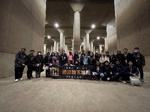 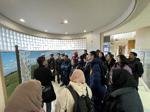 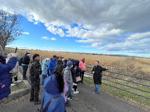 |
The participants visited the Metropolitan Area Outer Discharge Channel, which is designed to reduce flood disasters in the upstream areas from the Edo River to the Tone River. They collected information and exchanged views about its functions, effectiveness and costs about this world’s largest underground flood management facility. They also visited Watase Artificial Wetland, a Ramsar site, to gather information and exchange views about flood control, water supply, history of copper poisoning incident, wetland ecosystem and the role of annual controlled burning practices. |
| 2024/02/19-02/22 | Taiwan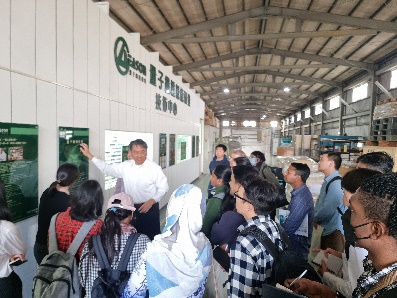 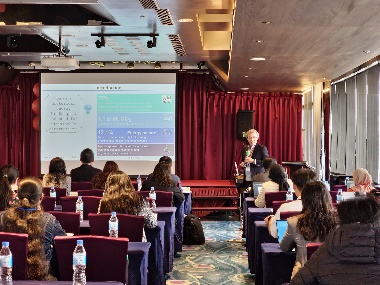 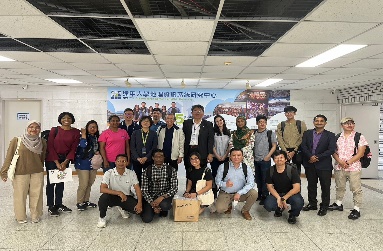 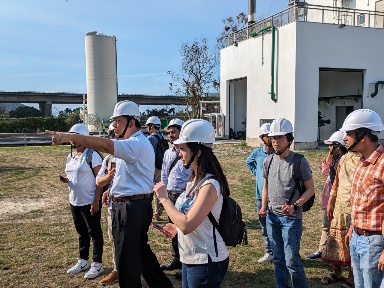 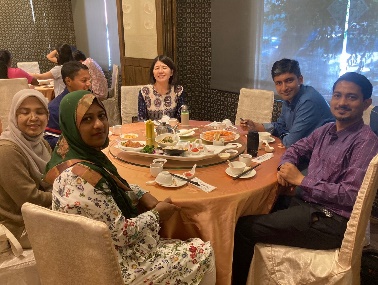 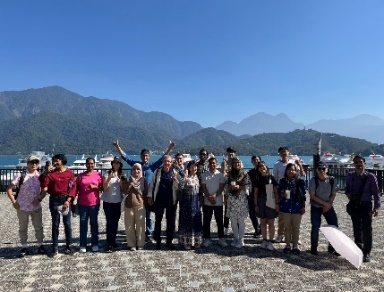 |
The filed study promoted international exchanges for r different disciplines, especially integrated solid waste management, material science, technology innovation for small island economy, and ways to meet sustainable development goals through the collaboration of industry, educational institutions, and local community members. Participants learned from different green technology institutes at Feng Chai University especially related to bioplastics and GIS. They also learned about international platform for biotechnology professionals to share technologies and research achievements through collaboration to develop relevant technologies in the bioenergy sector. |
| 2024/01/31 | Tokyo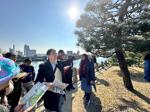 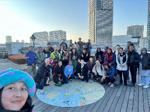 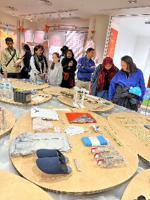 |
The participants visited areas in and around Tokyo to learn about flood and disaster preparedness and exchange views. In Tokyo, the participants gathered information about super levees along the Sumida River and the disaster prevention measures. Shioiri Park is located on the super levee that is designed for the evacuation site with emergency camp sites. They also visited Tokyo Rinkai Disaster Prevention Park in Tokyo Bay to experience disaster measures within 72 hours. Regarding private sector disaster management measure, they observed newly established Azabudai Hills. |
| 2023/12/02, 12/8 | Research Institute 2023/12/08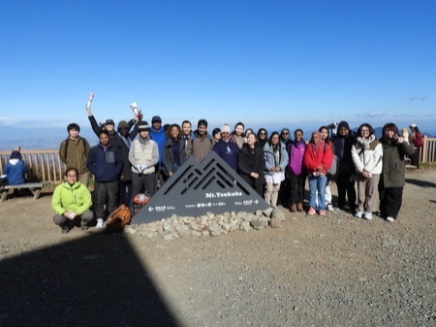 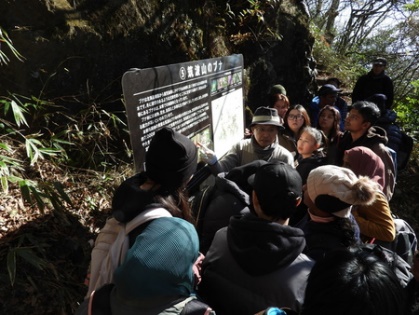 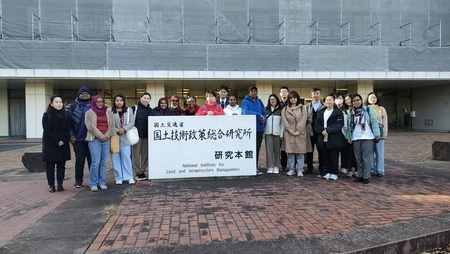 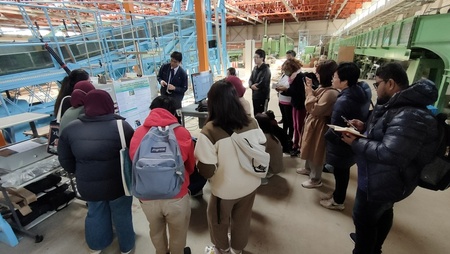 |
Tsukuba and received on-site explanations from Dr. Tanaka, an expert on the impact of climate change on beech forests in the area (2 Dec). At the National Institute for Land and Infrastructure Management (NILIM), the participants received training on sediment disasters and their countermeasures from Dr. Yamakoshi Director of the Erosion Control Research Office, and toured the experimental facilities. ibid. (8 Dec.). This enabled us to comprehensively enhance our knowledge on climate change issues from three perspectives: forecasting, natural effects (ecosystems) and social effects (disasters). |
| 2023/09/11-09/19 | Netherlands and Germany 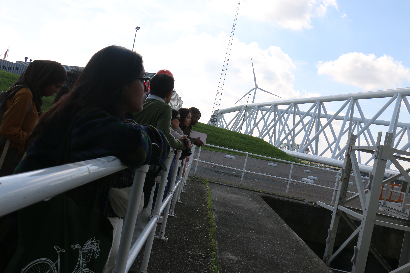 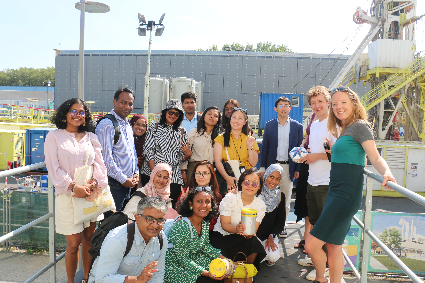 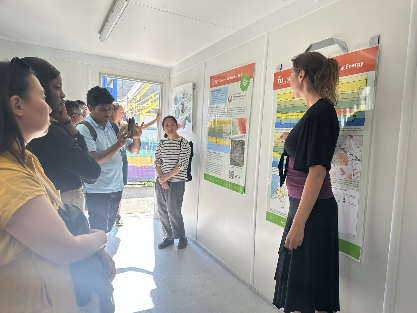 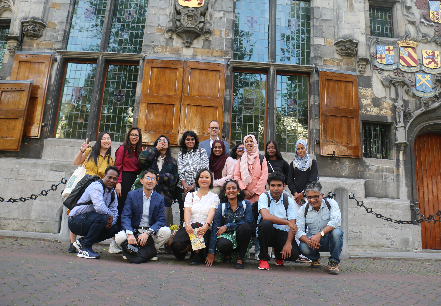 |
JDS students visited the cities of Amsterdam and The Hague to discuss the problems posed by climate change, flooding and other disasters to urban functions. They gathered information from discussions with city officials on how to restore canals while preserving their own traditional canal landscapes and on the latest methods of waste disposal in canals. They also visited disaster prevention facilities to protect economic facilities on major rivers from flooding and sea level rise and learnt more about unique technologies. At the same time, information was collected on how to deal with groundwater chlorination. In Delft, they were informed about a sustainable innovation project at the University of Technology called Green Village, which is created from community-industry partnerships, and the development of a geothermal power plant on campus. In addition, they attended a lecture and exchanged views with a representative at the office of the water board, the Netherlands' own water resources management organisation since the Middle Ages. In Rotterdam, information was collected on traditional Dutch water measures. They also visited a floating office and a community project on urban greening and collected information on urban planning while observing the redevelopment of water landscapes. In addition, they visited recycling case studies to hear local opinions. At the Rhine River Commission in Koblenz, researchers from the organisation provided detailed information on the transboundary management system for the entire Rhine River. In Düsseldorf, they visited one of the largest urban greening projects in Germany and saw how trees in huge buildings are managed. Overall, the JDS students gained information on Dutch and German cutting-edge attempts in water management and climate change and urban and rural development, and were able to compare them with examples from their own countries and seek solutions to their own problems. |
| 2023/09/13-09/15 | Osaki Town (Kagoshima) 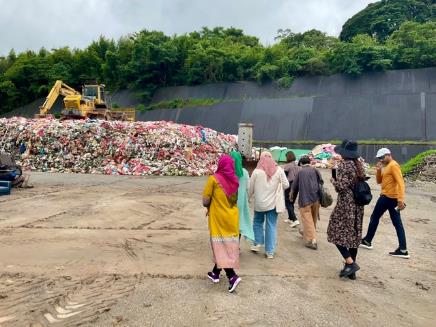 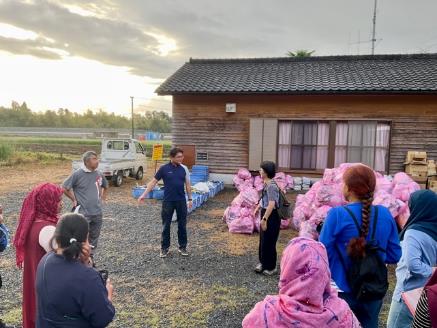 The length of the text is adjustable |
The participants visited Osaki Town, Kagoshima Prefecture, to learn about thorough resource recycling and circular society (i.e., the Osaki System), which Osaki has progressed through close collaboration among the municipal government, residents, and private companies under their original concept of Circular Village. During the field trip, they visited the final disposal site, organic and non-organic waste recycling facilities, local community waste collection, shochu (distilled spirit) factory, and eel farm. We also had special lectures by local experts from Osaki Town Office and Osaki SDGs Promotion Council. On the last day, the participants presented the characteristics of the Osaki System and the applicability of the system to their home countries. They discussed this with the local experts. |
| 2023/09/10-09/12 | Miyagi and Iwate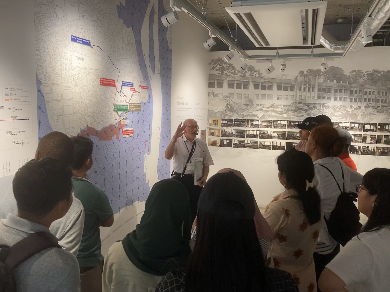 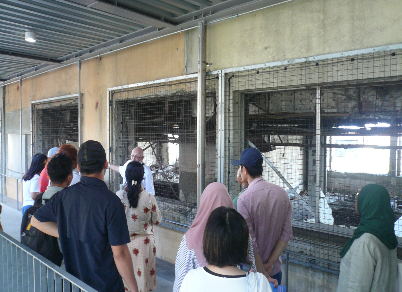 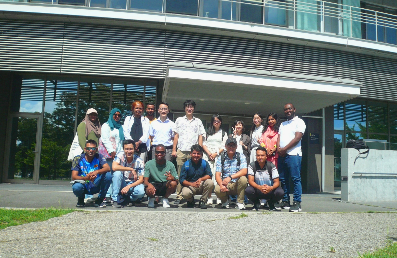 |
Participants visited ruins and museums related to the Great East Japan Earthquake in Miyagi and Iwate Prefectures, where they learned about the actual impact of earthquakes and tsunami disasters. They observed the distinctive geographical features of the Tohoku region's Pacific coastal area, which contribute to the expansion of tsunami damage in coastal areas. They also visited Tohoku University and attended a special lecture on the role of the ocean in disasters and abnormal weather. Participants engaged in discussions and exchanged opinions on disaster prevention challenges in various countries around the world. |
| 2023/02/11-02/18 | Kansai (Kyoto・Osaka・Kobe)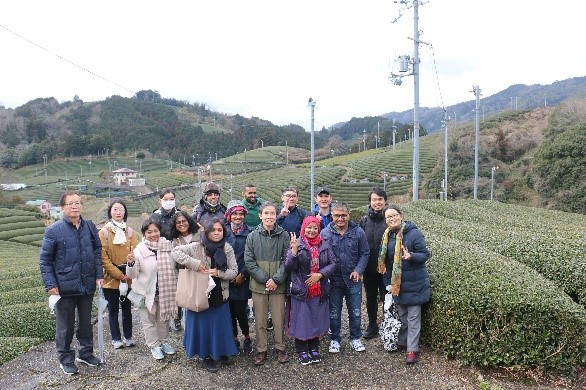 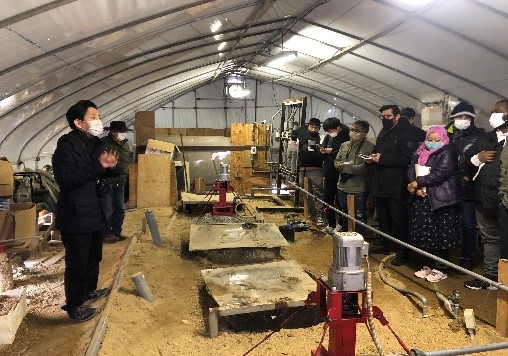 |
From February 11 to 18, 2023, the participants attended lectures by three researchers from Kyoto University and Kobe University, and learned academic and practical knowledge on water environment management, wastewater/waste treatment and resource recovery and biomass energy production, organic and smart agriculture through visits to Lake Biwa Museum, Yagi Bioecology Center, Wazuka Town, Kyoto University Graduate School of Agriculture Farm, Lake Biwa/Yodo River Water Quality Conservation Organization, Kobe City Higashinada Treatment Plant and Yuge Farm. Through visits to the Kyoto Graduate School of Agriculture farm, the Lake Biwa-Yodo Water Quality Conservation Organization, the Kobe Higashinada Treatment Plant, and the Yumigake Farm, participants acquired academic and practical knowledge about water environment management, wastewater/waste treatment/resource recovery and biomass energy production, organic farming and smart farming. Finally, through group work and presentations, students gained a deeper understanding of sustainable water environment management, agriculture, and environmental conservation. |
| 2023/01/31-02/03 | Amamiohsima (Kagoshima) 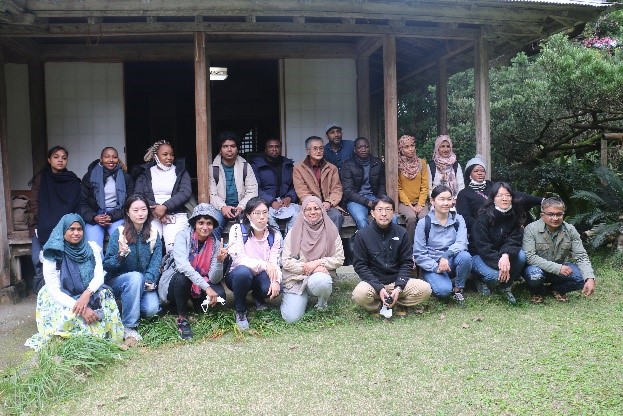 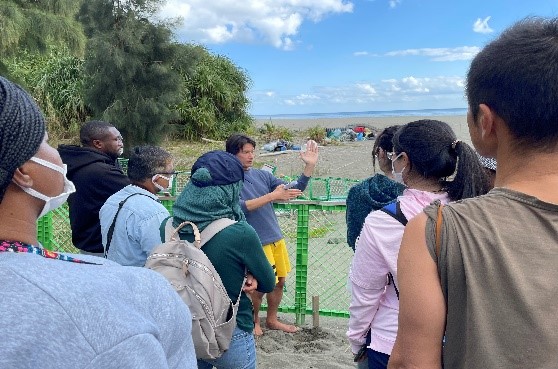 |
The JDS students visited Amami Oshima Island, which will be registered as a World Heritage site in 2021, to gather information and exchange views on the conflict between biodiversity conservation and regional development, the ideal form of ecotourism, future utilization of World Heritage natural resources, and disaster prevention measures in the region. The JDS students first learned about endangered and invasive species on Amami Oshima from local experts. Based on this, they participated in ecotourism through a certification program for guides. At the same time, they learned how to sustain the nature conservation required by the World Heritage registration from the construction administration-oriented economy that has continued for many years since the end of World War II. Furthermore, they gained the ability to analyze how disaster prevention measures due to global warming and typhoons are related to the sustainability of the local economy and environment. |
| 2023/01/25 | Kasaikaihin park・Tokyominatorie・Asakusa・Shioiri park (Tokyo) 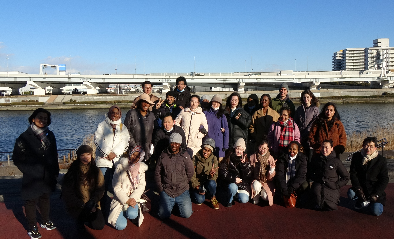 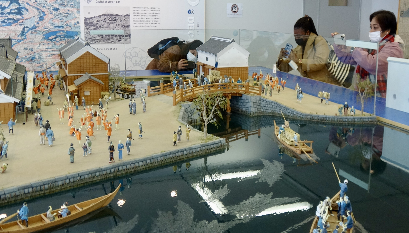 |
In this activity, the group visited a Ramsar site in Tokyo to observe species conservation and public access. They also visited a museum to obtain an overall picture of the history of Tokyo's bayfront development and disaster prevention. Furthermore, to learn about the Tokyo Metropolitan Government's disaster prevention activities in the Sumida River basin, they visited super levees, bridges, and disaster prevention equipment to gather information and exchange views on countermeasures against urban disasters. This enabled the JDS students to examine the future of disaster prevention measures in their own countries by comparing them with examples from their own countries. |
| 2022/12/07-12/09 | Kitakyusyu (Hukuoka) 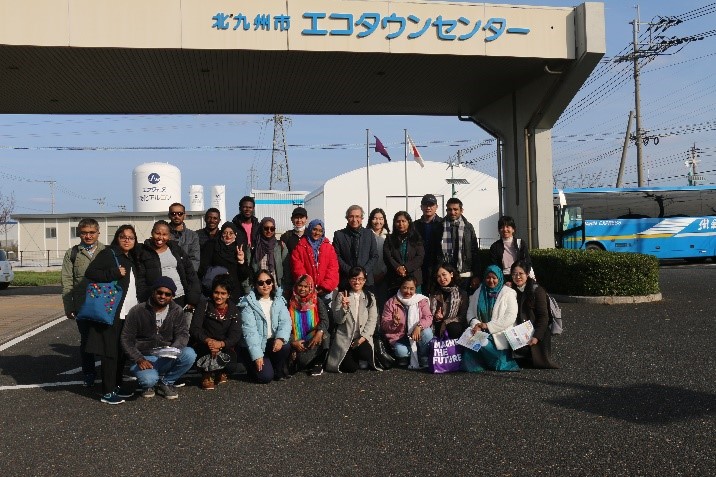 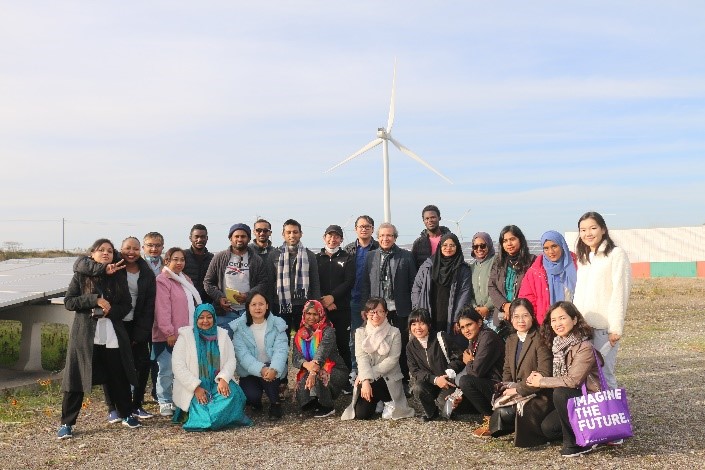 |
During this field study, we visited Kitakyushu Eco-Town and learned about the importance of cooperation between industry, government, and the city. Here, the students learned about recycling technologies for plastic bottles and e-waste. They also learned about wind and solar power generation systems in the Eco-Town complex. They also visited Yamaguchi Dairy's biogas plant, which produces biogas from by-products and waste from the dairy industry and uses it as an energy source for the industry. Finally, the students visited an incineration and resource recovery facility in Shimonoseki City. The students were able to understand the importance of having a life cycle thinking about resource management. |
| 2022/12/06 | Metropolitan Area Outer Discharge Channel (Saitama) and Watarase Wetland (Tochigi)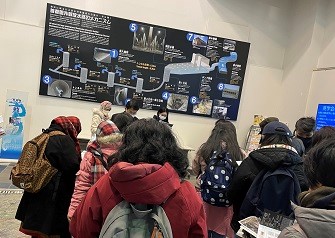 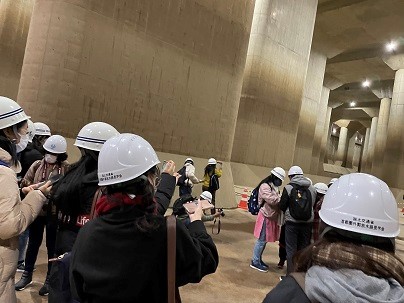 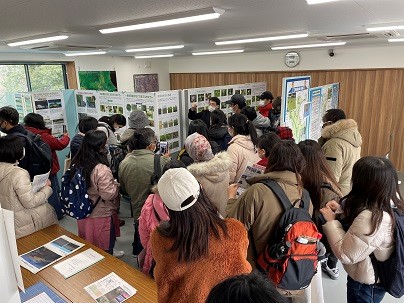 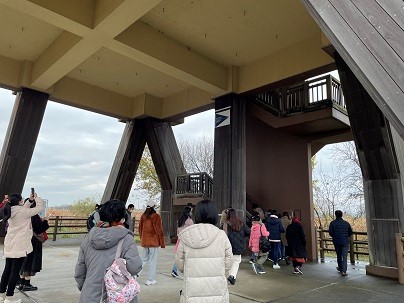 |
The participants visited the Metropolitan Area Outer Discharge Channel in Saitama Prefecture and Watarase Wetland in border areas of Tochigi, Ibaraki, Gunma, and Saitama prefectures. This training focused on flood control and wetland management in the Kanto region. At the Outer Discharge Channel, the JDS students visited the world's largest underground flood control facility, which is designed to reduce rising water levels in four surrounding rivers. Guided tour gave them detailed information about this facility and its functions. This allowed the JDS students to gather information and exchange opinions on the possibility of organized infrastructure development. At Watarase Wetland, the students learned about the reservoir's role in controlling flooding of the Watarase River, which flows around Furukawa City, to improve water quality, provide water for agriculture and domestic use, and conserve wetlands and birds under the Ramsar Convention. They also gathered information on the damage caused by the 2019 typhoon. In addition, the site's former Yanaka Village was the site of eviction during the Ashio Mine Poisoning Incident at the beginning of the 20th century, allowing the group to gather information and exchange views on the pollution movement in Japan. |
| 2022/11/22 | Yokota farm (Ibaraki)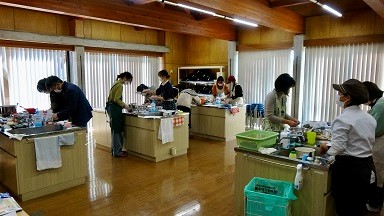 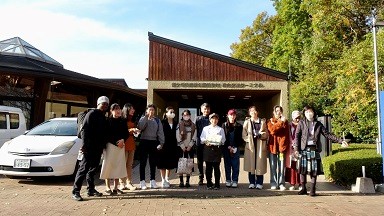 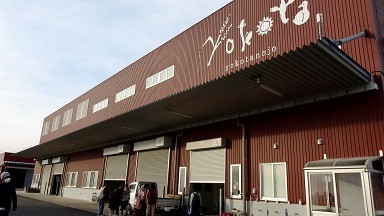 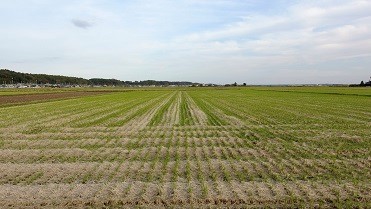 |
The training on food and agriculture was conducted at Yokota Farm. This smallholder business has cultivated rice in Ibaraki Prefecture for several hundred years. After being incorporated as business entity about ten years ago, Yokota Farm has received Emperor's Award and the Minister of Agriculture, Forestry, and Fisheries Award for its good example in small-scale farming businesses. JDS Fellows visited the farm and collected information from Mr Yokota and his wife on farm management, value chain, food education, measures for abandoned land, and agricultural tourism. They were also able to gather information and exchange opinions on methods of preserving and sorting harvested rice, mechanization, and cost reduction. |
| 2022/09/14-09/16 | Osaki Town (Kagoshima)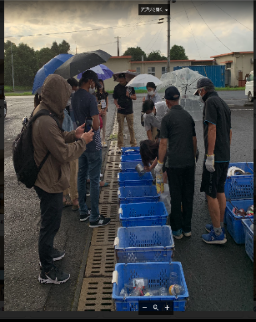 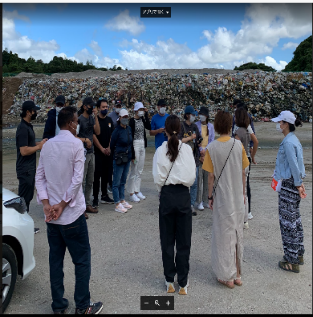 |
The participants visited Osaki Town in Kagoshima Prefecture to learn about the formation of a recycle-oriented society. It developed a “Osaki System,” in which general waste materials are thoroughly separated, sorted and recycled. The tour included lectures and discussions by Osaki Town environmental officials (including a JICA-supported project for horizontal deployment in Indonesia) and tours of various facilities (final disposal landfill, recycling facility, general waste incineration facility, and resource waste base collection). The participants also learned about town’s policies to promote youth immigration as part of regional revitalization and regional exchange through recycling. On the final day, the participants made presentations on the challenges and strengths of promoting resource recycling in their home countries under the theme of the applicability of the Osaki system to their home countries, and received advice from Osaki Town officials. |
| 2022/09/06-09/08 | Ryukyu University (Okinawa)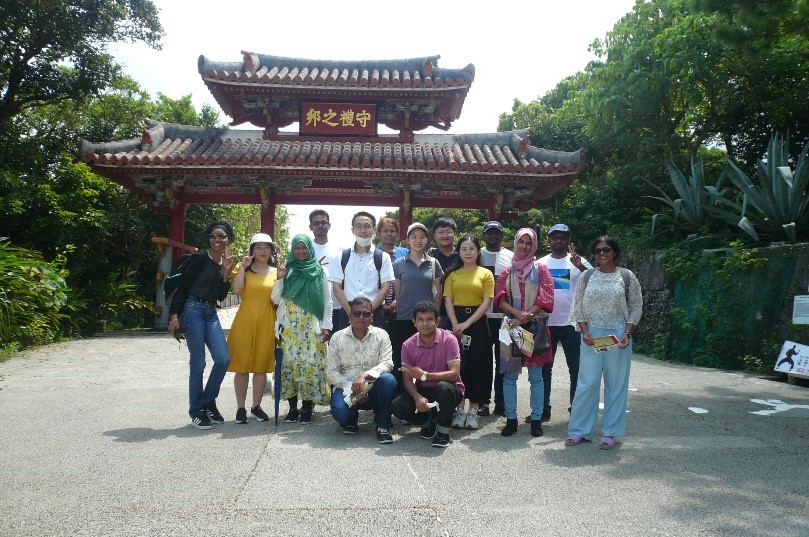 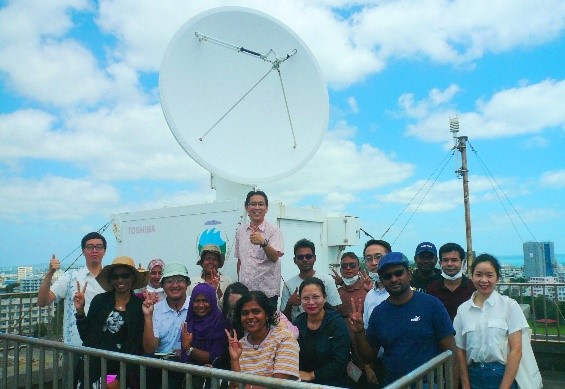 |
The Participants listened to lectures on tropical storms and meteorology by two researchers from Ryukyu University. They visited the Fujukan Museum on the Ryukyu University campus and learned about the relationship between natural disasters and ecosystems. They acquired information about the industry and tourism in the Okinawa Islands through a tour of Shurijo Castle. Based on what they learned, they engaged in group work and deepened their understanding of sustainable development and environmental conservation through presentations and discussions. |
| 2022/08/28-08/31 | Kushiro (Hokkaido)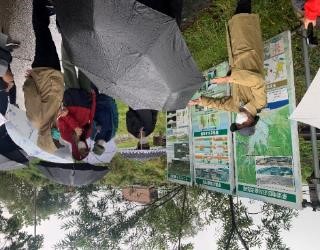 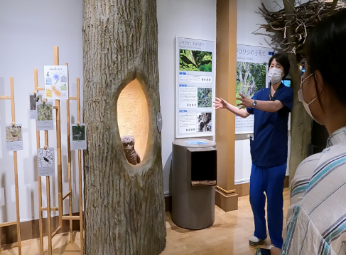 |
The participants visited the Kushiro Wetland area in Hokkaido to deepen their understanding about marshland ecosystem services, conservation of red-crowned cranes (a national protected species) and rare plants and animals, ecosystem conservation measures through the Old River Restoration Project, and eco-tourism promotion by visiting facilities (Akan International Crane Center, Wildlife Conservation Center, and Kushiro Construction Department of MLIT) and relevant areas. On the last day, the participants presented about the conservation of the Kushiro Marsh ecosystem and lessons learned for environmental conservation, disaster prevention, and industrial promotion in comparison to their home countries. They received advice on their presentations from experts. |
| November/2019 | Kita-Kyushu/Yamaguchi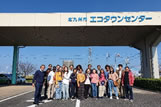 |
This domestic field trip gave our students the opportunity to grasp the latest technological innovations in material recycling and energy recovery efforts in Japan. In Kitakyushu Eco-Town students learned about the integrated recycling complex in the Eco-Town Center and then had the practical visits to the PET bottles and cans recycling facilities. In Yamaguchi Kenraku milk factory the students learned about the fermentation of its organic wastes and by products to produce biogas that is subsequently used to produce steam. The steam is then used as energy input into the milk industry. We also visited Shimonoseki incineration facility and material recovery facility where students strengthened their knowledge about integrated waste management. Finally in Sanyo recycling facility the students could learn about the recycling of fish residue. |
| September/2019 | The Netherlands/Germany |
This field trip aimed to enhance JDS Fellows’ knowledge and insights about agricultural practices, disaster management, and water governance in the Netherlands and Germany. In Amsterdam, the Fellows observed water canals that are important part of city planning and economic development. In Haarlem, the Curuquius museum showed the historic water drainage practices. In Delft, the Fellows observed water drainage practices and dairy farms in polders. They also had seminars with graduate students at the Delft University of Technology. The Fellows then visited the unique storm surge barrier called Maeslantkering at the mouth of the Rhine River (picture) to understand the Delta Work of the Netherlands and the importance of flood protection for the economy. The Fellows then visited Rotterdam to observe the environmental restoration of former development sites and floating forests. They presented about their research topics at the Rotterdam University of Science and Technology and interacted with undergraduate students there. In Germany, the Fellows had a seminar and a short tour about flood management and water governance at the Rhine and the Rhine Commission in Koblenz. Then they went downstream to Cologne for more flood protection practices. |
| August/2019 | Okinawa |
Students visited University of the Ryukyus and attended lectures on tropical cyclone observations, forecast, and disaster prevention. Students also had a short campus tour including a meteorological radar system and university museum. On the following day, the students visited Shurijo Castle Park to learn historical background on the Ryukyus with cultural communications with China and surrounding countries. |
| January/2019 | Kushiro(Hokkaido) |
With sustainable management of Kushiro Wetland as a core topic, students learned about conservation and utilization of natural resources for economy and tourism, river restoration, and endangered wildlife conservation in the Kushiro Wetland area through site visits, lectures and discussion by local experts. |
| December/2018 | Kita-Kyushu/Yamaguchi |
Students visited Eco Town Center in Kita-Kyushu City and received an overview of the Eco Town project including all the recycling initiatives. The main goal of Eco-towns in Japan is to design a recycling-oriented society where wastes in one sector can be used as raw materials in other industrial sectors. After the Eco Town visit, the students visited a biomass facility in Arao city. On the following day, the students visited facilities to make effective use of biogas and methane gas and received explanation about the relationship between region and industry in waste recycling. |
| September/2018 | Okinawa |
This field trip is designed to examine the challenges and possibilities of developments in Okinawa. This area has been one of the most popular tourism destinations in Japan with rich cultural, environmental, and historical heritages. FOCUS: (1) the conservation of local ecology and marine ecology; (2) a historical study about the establishment of Ryukyu culture and impact of World War II on the local environment and economy; (3) historical roots of Japanese-Okinawan relations; and (4) possibilities of future tourism in remote areas |
| July/2018 | Liverpool(UK) |
Visit Liverpool, UK, learn about Mercy River campaign, the pioneering environmental symbiosis city policy in the world. Students learned about water management policy and urban development centering on rivers and considered policy application to their country while comparing their case. |
| May/2018 | China | This international internship to China consisted of three parts. (1) Beijing internship: Field trip to Xiaojiahe Wastewater Treatment Plant (Beijing) and the China-Japan Joint Seminar on Water Environment Technology in Tsinghua University. (2) Tianjin internship: Field trip to the Sino-Singapore Tianjin Eco-city and the Symposium on Technological Innovations in Environmental Control and Resources Recovery & Utilization in Nankai University, Tianjin. The two field trips are related with environmental issues and applicable technologies in China, through which the students can know how people are trying their best to make their surroundings more beautiful and sustainable. During the seminars, the students had good chance to communicate with the young generation of scientists and specialists who are contributing themselves to environmental protection and sustainable development in China. (3) 2018 International Students Conference on Environment and Sustainability (ISCES) hosted by the UNEP and Tongji University. The students were offered great opportunities to exchange ideas on the environment and sustainability regarding plastic wastes with fellow students from more than 30 countries. The students also actively participated in the intensive lectures, group discussions, field trips to rural and urban areas, and poster competitions. |
| February/2018 | Kushiro (Hokkaido) |
On the theme of sustainable natural resource utilization, students learned about natural revitalization, tourism use of Kushiro Wetland, rare wildlife conservation in Kushiro Marsh, historical cultural background of nature management, and hotel management using waste heat and agriculture among other topics. |
| February/2018 | Mito (Ibaraki) |
A tour of Lake Senba in Mito city. Mito city is focusing on the conservation of the historical landscape and is also working on the lake environment of Lake Senba, which was originally used as agricultural water. In addition students had explanation about the city's efforts and water purification facilities that do not impair the historical landscape. |
| February/2018 | Okinawa |
JDS students learned the influence of overuse and climate change on coral reefs, the cultural formation of urban landscape in Okinawa, and the relationship about agriculture and regional promotion. With the cooperation of the University of the Ryukyus, we had the opportunity to attend lectures of researchers at the university and learned the latest research results. |
| February/2018 | Tsukuba (Ibaraki) | Students visited the Center for Genetic Resources, Gene Databank and Agricultural Environment Change Research Center in the Agricultural Research Organization, and learned the latest knowledge on genetic resource recording, preservation technology and soil carbon storage research through lectures and facilities tours. |
| January/2018 | Tokyo | This year JDS students together with 6 professors joined this domestic trip which mainly consisted two activities: (1)visiting to the National Museum of Emerging Science and Innovation; and (2)surverying the Tokyo bay, especially Odaiba, Hinode, and Asakusa areas. All the participants experienced the advancement of technologies for environmental managemnet in Japan, especially on surface water systems and waste disposal, which is beneficial for the students to obtain the real ideas of betterment of the environment. |
| December/2017 | Kita-Kyushu/Yamaguchi | This trip gave students to learn about the importance of industry-government-city collaboration regarding environmental management. In the visit to Kitakyushu Eco Town we learned about the technologies to recycle PET bottles and Al and Steel cans. We also visited Yumoto biomass boiler that supplies hot water to a hotel by using only wood chips as fuel. We had the opportunity to visit Yamaguchi Dairy industry biogas plant. This plant uses the byproducts and wastes from the dairy industry combined with sludge form the local wastewater treatment plant and produces biogas that is used as a source of energy in the dairy industry. Finally we visited a food waste recycling plant u\in Ube city. The plant uses the food wastes from super markets, convenience stores, hotels, etc to produce animal feed. From these field studies students understood the importance of having a life cycle thinking regarding resource management. |
| September/2017 | Hokkaido |
We surveyed the Northern part of Hokkaido (Rishiri Island, Sarobetsu Marsh, Daisetsuyama Asahidake etc.) and conducted a survey to preserve the forest and wetland ecosystem. Especially at Hokkaido University Research Forest, we made measurements on the allometry of red-faced Pinea pine trees, of which the existing data is not enough yet. |
| July/2017 | Liverpool(UK) | Mercy River campaign is a pioneering environmental symbiosis in the world. Under the guidance of Professor Peter Batey of Liverpool University, who was the chairperson of this campaign, JDS students were able to gain knowledge about the urban development centering on rivers, water pollution policy and participation process of citizens. |
| March/2017 | Ibaraki | JDS Fellows and SUSTEP students visited Shimizu Farm and learn about small/medium sized farm management, soil production, and larger agricultural concepts from Mr Shimizu. |
| January/2017 | Okinawa | JDS Fellows and SUSTEP students learned about desalination technologies, wetland conservation, coastal development and historical conflicts. |
| January/2017 | Tokyo | JDS Fellows and SUSTEP students visited the water supply museum in Tokyo. They also observed super levee development areas along the Sumida River to better understand Tokyo's water management policies and disaster management. |
| January/2017 | Kushiro (Hokkaido) |
The purpose of the trip was to learn about the lifestyle, industrial activities, biodiversity protection, waste management, and eco-tourism initiatives in Hokkaido, one of coldest area in Japan. In Betsukai town, the study focused on business entities working with dairy farming and biomass utilization. In Kushiro city, our fellows visited Lake Touro, Kushiro wetland and some other sites related to eco-tourism. Through this trip, the students learned about the interlinkages between socio-economic activities and the environment in a cold area. |
| December/2016 | Tokyo |
JDS Fellows and SUSTEP students visited the solid waste treatment system in Tokyo at the Central Breakwater Intermediate and Final disposal facilities and sites. They learned about recycling technologies and future waste management problems in Tokyo. |
| October/2016 | Koga (Ibaraki) | JDS Fellows visited "First Eco Park" and "Dream Factory" of the Sekisui House Corporation in Koga City. This visit was to understand the effort of private companies to build ecologically friendly houses. Fellows learned about newest technologies for "Zero Emission Houses" with the combined use of the newest solar panel system and gas-energy production. They also observed the technologies for disaster adaptation such as the automatic emergency energy supply and rain water collection. The Sekisui House Corporation also has a recycling factory here to collect 100% of its building wastes to be recycled. Through this visit, the Fellows could develop the idea about up-dated technologies for house building that can be useful in developing countries. |
| September/2016 | Sugadaira (Nagano) |
JDS Fellows in the first year and the second year joined this three-day trip to the Sugadaira area in Nagano Prefecture to mainly study about "Satoyama" practices. On the first day, they observed agricultural area of Obuse, where chestnuts and canola oils have been produced. They also observed old Japanese houses here. At night, they received a short lecture on vegetation in the Sugadaira area. On the second day, the Fellows conducted vegetation survey in the Sugadaira area through trekking and discussed about the maintenance of the alpine ecosystem, including the function of high-altitude wetlands. On the third day, the Fellows received lecture and conducted fieldwork about the impact of the increasing deer population on the mountain ecosystem. They also observed tourism and resort expansion in Karuizawa. |
| September/2016 | Ulaanbaatar (Mongolia) |
The Fellows participated in the seminar on urban environmental improvement, which was organized by the University of Tsukuba and hosted by the City of Ulaanbaatar. Researchers from the National University of Mongolia were also invited as speakers. The topics focused on remediation, especially as it is related to soil and water contamination. On the second day, the Fellows had excursion to actual contaminated sites, and learned about some specific plant species that tend to absorb heavy metals. Ulaanbaatar City employees guided the Fellows and our professor to the Ger area where soil pollution is most obvious. |
| August- September/2016 |
The Netherlands |
The Fellows participated in the joint seminar between the University of Tsukuba and the Delft University of Technology in the Netherlands. On the first day, the Fellows spent a few hours to discover the roles of the intricate canal system in Amsterdam historically. On the second day, they moved to the town of Delft and had a tour from a Delft University of Technology professor about how waterways played important roles in the development of this city. On the following day, the Fellows participated in in-class seminar and listened to lectures by Delft University of Technology professors and doctoral students about disaster prevention, green development of cities, and water management. In the afternoon, the Fellows made presentations about environmental issues in their countries and exchanged ideas with researchers at Delft. On the fourth day, a representative in urban planning from the Rotterdam government came to present Rotterdam's urban planning and disaster prevention efforts. In the afternoon, the Fellows were guided by this person to the Rotterdam area and observed on-going redevelopment plans in the city. On the fifth day, the Fellows visited and had a lecture at Maeslantkeringweb, the large storm surge barrier. They collected information about the Netherlands Delft Work and technologies to save ports from storms and floods. Afterward, the Fellows visited one of the largest intensive agricultural complexes in Europe called "Westland." Here the Fellows learned about green house agriculture and traditional water routes to transport agricultural goods. The Fellows overall learned about disaster management, water management, urban/regional planning, and agricultural efficiency. They chose one topic and wrote a report by comparing issues in their own countries. |
| June/2016 | Ashio (Tochigi) | JDS Fellows visited the Ashio valley, the former copper mining site. Here they learned about the impact of copper mining on the valley environment, especially at the former neighborhood of Matsuki. They also observed some remnants of advanced industrial developments in the town, including the Japan's first hydroelectric dam site, iron bridges, and mine technologies. From a guide who grew up in Ashio, the Fellows learned about social life of Ashio in the mid-twentieth century. Another important aspect of this trip was to observe the forest restoration efforts in the Valley by volunteers. The Fellows could learn how once devastated valley became covered with green areas and brought back some wildlife such as bears, deer, and monkeys. The Fellows wrote their reports on the history of Ashio in comparison with issues in their own countries. |
| April/2016 | Ibaraki |
JDS Fellows visited Shimizu Farm, one of leading organic farms in Japan, to learn about soil production, breeding, small-scale farm management, and the marketing of farm products. Mr Kiyoshi Shimizu, the owner of the Farm and the executive director of nation-wide agricultural organization called the BM Technology Association, showed how he came up with ideas of making Carbon rich soil and weed control technologies as well as his BM formula (treated and enriched wastewater), as organic fertilizer. The Fellows also met various business partners in Ibaraki Prefecture. Mr Shimizu and these partners have engaged in the lake ecosystem restoration project with their own funding. This project is based on a premise that farming and ecosystem restoration should be interdependent activities; and farmers must have more comprehensive visions in taking advantage of regional ecological characteristics for farming. |
| January/2016 | Tokyo |
In the morning, in collaboration with Tokyo’s Bureau of Environment, JDS Fellows visited one of the most high-tech incineration plants in the Odaiba area and learned about waste management and recycling. They also obtained information about underground garbage collection pipes in the area. In the afternoon, they visited community-based culture/history education facility at Fukagawa. The museum has real-size houses and building arrangement of the Edo period. This visit helped the Fellows to better understand the past flood and disaster management ideas in the Sumida watershed. Those Fellows who visited the super levy in December 2015 could understand the historical changes in river flood management in Tokyo. |
| December/2015 | Tokyo |
In the morning, in collaboration with Tokyo’s Bureau of Environment, JDS Fellows received lecture about waste management of the Tokyo Metropolitan Government. They received information about garbage collection, processing, and final disposal processes. The Fellows then visited garbage processing facilities and final disposal site called the Central Breakwater Outer Landfill Site. They learned about the future plans of waste disposal and various ways to maintain solid waste safe from environmental contamination. In the afternoon, the Fellows took a water taxi and observed Tokyo’s “super levy” project and other river management areas in the Sumida River. |
| September/2015 | Izu/Shimoda (Shizuoka) |
This trip attempted to better understand rural development (e.g., community-based tourism) and the marine environment. The Fellows visited the University of Tsukuba's Marine Research Center and observed some of its on-going research projects. They had a small seminar about geoparks. Dogashima cruising allowed them to observe the formation of unique geological features. In Toi, the Fellows learned about the mining operation and tourism development at the former mining site. They also received a lecture about the early contact history in Shimoda between Japanese and Americans at Ryosenji Temple. |
| September/2015 | Ulaanbaatar (Mongolia) |
JDS Fellows and JDS graduates presented their research topics that are related to urban environmental problems in Ulaanbaatar. This seminar was hosted by Ulaanbaatar City. They exchanged ideas about the future cooperation efforts with the city. The Fellows then visited City's waste treatment plant and Ger areas to better analyze the conditions. |
| July/2015 | Hanoi (Vietnam) |
This seminar was conducted in collaboration with the Hanoi University of Natural Resources and Environment (HUNRE) and the Delft University of Technology. The aim was to analyze water problems and find some possible solutions. JDS Fellows acquired knowledge about urgent water problems in Hanoi in two-day seminar. They also spent one day in the field, observing and collecting data about water problems. |
| June/2015 | Ashio (Tochigi) |
JDS Fellows visited the former Ashio copper mine site. Former residents and guides showed them to important industrial achievement during the thriving period of mining operations. The Fellows also observed reforestation activities in the Ashio valley. At the Ashio History Museum, they acquired knowledge about the history of mining technology and the emerging environmental activism. |
| June/2015 | Shanghai (China) |
This international internship was carefully designed with the combination of an international student conference (2015 International Student Conference on Environment and Sustainability) with two additional days' field trip particularly focused on applicable technologies and management systems of waste and wastewater treatment in China. This activity was co-organized by Tongji University (China).The Fellows learned how to use different treatment technologies to cope with different organic solid wastes and wastewaters, making full advantages of these wastes to benefit local people. |
| March/2015 | Kasumigaura (Ibaraki) |
This trip introduced JDS Fellows to some major economic activities in the water environment around Kasumigaura Lake, Japan's second largest lake. They observed lotus root harvesting and other wetland crop cultivations. They visited the former water town, in which elaborate canal systems developed, and only boats were used for transportation. Then they observed the recent road and bridge works around the lake. |
| February/2015 | Watarase Yusuichi (Chiba) |
As the only Japan's artificial wetland to be protected under the Ramsar Convention, Watarase wetlands functions as flood control, water purification, and water supply reservoir. The area also includes the Yanaka village site, which was forcibly closed due to copper pollution from the Ashio mine in the beginning of the twentieth century. The Fellows learned about both history and current scientific practices here. |
| January/2015 | Meiji Gakuin University |
With renowned environmental/disaster law expert from the University of California, Berkeley, JDS Fellows went to Meiji Gakuin University for a seminar. At this seminar they learned about disaster law that pertained to large-scale pollution. The Fellows also exchanged ideas with faculty members at Meiji Gakuin to expand their academic capacity. |
| December/2014 | Tokyo |
This trip aimed to acquire knowledge about community-based management in urban settings. The Fellows visited the Fukagawa History Museum, which is one of the successful and earliest attempts in Tokyo by community to protect and promote local culture and history. They also visited the Ainu Cultural Center near Tokyo station, where some Ainu cultural exhibitions helped Fellows better understand the importance of establishing cultural center in urban areas. |
| September/2014 | Kyushu University |
The Fellows had 5 days' trip in Minamata including full field work, lectures and group working in order to answer the question "Why has Minamata not been solved yet?" which was initialled by Kyushu University. They visited Soushish Museum of Minamata disease, Chisso Company, Hotto House where the fellows interviewed some patients of fetal Minamata disease, uncertified patients in Amakusa Island, etc. Finally they directly exchanged ideas with the Mayor and officials of Minamata city Government. Through this trip the Fellows experienced how Japanese people dealt with and are dealing with the real environmental issues. |
| September/2014 | Nagano |
This fieldwork was conducted in the primary forest region of Buna trees in northern Nagano prefecture primarily to understand forest ecology and rural/regional development. Students interacted with local foresters and farmers to understand economic and social issues they face today. Students also participated in one of distinctive local autumn festivals in Iiyama City and learned about Japanese religious culture. They lodged in one of temples, which serves as various social functions, including forest therapy for cancer patients. |
| August/2014 | Hanoi (Vietnam) | JDS Fellows and graduates presented their research topics to Vietnamese people, including those who might be interested in the JDS Fellowship. The presentations focused on environmental policies, climate change, and disaster management. The Fellows also visited the Ministry of Natural Resources and Environment and its Vietnam Environmental Agency and a few agencies to acquire knowledge about urgent environmental issues for Vietnam. |
| July- August/2014 |
Okinawa |
JDS Fellows in Environmental Sciences and those Fellows in Social Sciences and Humanities had a joint field trip to Okinawa. They acquired knowledge about the history and culture of the main island as well as some on-going problems of military base replacement debates in Futenma and Henoko. |
| July/2014 | Kyoto/Nara | In Kyoto and Nara JDS Fellows observed various types of Japanese forest management, including "biotope" forests that were established to enhance biodiversity conservation. They also observed historical forest management practices at the end of the sixteenth century. A short seminar was offered to better understand reforestation and the forest's resilience. |
| February/2014 | Hiroshima/Miyajima |
This study excursion introduced JDS Fellows to some salient aspects of Japanese culture, history, the urban environment, environmental management, and tourism in Hiroshima city and Miyajima. In Hiroshima, visits at Hiroshima castle, medieval garden, Atomic Bom Dome, Peace Memorial Park/Museum enhanced the understanding of changes in the urban environment, tourism, green/public space before and after World War II. Fellows also had a grasp of the history of the impact of Atomic bomb on the city by looking at museum exhibition and surviving trees as well as the significance of maintaining cultural and historical heritage for public environmental education. In Miyajima, Fellows visited ancient forests and the rare colony of coniferous trees to investigate distinctive vegetation/ecological features in the national park. Also, they visited world heritage site and saw important roles cultural heritage sites play in managing national parks as well as sustaining local businesses, including tourism. |
| February/2014 | Shirakami |
The experience of ecotourism in Shirakami is a valuable experience to JDS fellow. They learned World Natural Heritage Site mountains, traditional hunting and natural ecology of winter. We understand the conservation is important for variety natural environment in the world, a unique local culture is present in each region. |
| December/2013 | Tokyo |
Visited Tokyo and learned about urban greening. It was a meaningful experience for JDS fellows for their research to learn about historical context of the land and the social mechanism. |
| November/2013 | Kawauchi(Ibaraki) | Visit the Kawauchi village and learned about after the nuclear accident and subsequent evacuation and the restoration process. In addition,we learned Consideration for vulnerable groups and mutual aid relationship in the region. |
| November/2013 | Kushiro(Hokkaido) | Observed the high moor of Kushiro, we understand the need for monitoring of wetlands for environmental protection. This way of thinking, it would be helpful for forest conservation policy. |
| October/2013 | Kyoto | Observed Kyoto and able to collect the information regarding groundwater resources in the region in terms of different Vietnam. It was a very meaningful opportunity for his research. |
| October/2013 | Hitachi Oomiya (Ibaraki) | Visited Hitachi Omiya and learned that Japan is a mountainous country from its terrain. In addition, we learned a better understanding for mutual aid relationship of the community that are forced to part-time land use and aging problem. |
| September/2013 | Oze (Gunma) |
Observed wetland convervation and identified typical wetland vegetation at Ramsar designated Senjogahara of Nikko and Oze National Park. At Oze National Park, we interviewed local people and collected information about access control to the national park as well as recent trends of tourists. |
| July/2013 | Yasuoka village (Nagano) | Visited NPO Greenwood, which provide environmental education while managing nature. Students could obtain valuable information about the activities and issues of community revitalization projects of rural U-turn and I-turn. They also visited a deputy mayor at the Yasuoka village office. |
| July/2013 | Fukuroi (Shizuoka) |
Visited the Asaba Sasaki Kitaro monument that was build by Fan Boichau came to Japan in the early 20th century. In the guidance of the Asaba Vietnam Exchange Association representative, students enjoyed watching a DVD that summarizes exchange between the two countries. Students discussed the future development for the two countries. Also visited its museum and learned about the geography, history, and the natural environment of the Fukuroi area. This visitation instilled among JDS students a new perspective about the future of the Japan-Vietnam relations. |
| July/2013 | Bandung (Indonesia) |
Attended the Pacific Conference of the Regional Science Association International in Bandung. The conference helped find out about the latest research on regional science and regional development policies. Students also visited some historical and natural places related to the environmental issues. |
| June/2013 | Kinu natural park (Tochigi) | Observed the natural features at parks and nature conservation areas in Kinugawa water system. Student could learn the reality of nature conservation management in residential areas. |
| June/2013 | Fukuoka (Kyushu) | Visited the JICA Kyushu office and exchanged views and information about the current state of nature conservation projects in Mongolia within an ODA scheme. Also, visited the Sanctuary of pyroclastic flow trace of Fugen ,and learned about damage mitigation and disaster prevention measures. |
| June/2013 | Memanbetu (Hokkaido) |
Visited Shiretoko National Park and collected information about eco-tourism. Students learned about the surveying practice for ecosystem restoration in Salicornia wetlands in natural forests around the campus of the Tokyo University of Agriculture at Okhotsk. This visit helped understand the challenge for ecological restoration. The two JDS students made research presentations, and exchanged views on issues surrounding the natural environment of Vietnam and Mongolia. |
| February/2013 | Shiretoko/Hokkaido | Observed the state and management of the fishery within the World Heritage site. Students interviewed tourism officials to find out about the above topics. They also collected information about ecology and Ainu culture in the Shiretoko area. |
| February/2013 | Shanghai (China) | Visited water treatment facility and waste management in the city to understand Chinese efforts for establishing recycle oriented society. |
| January/2013 | Izumi (Kagoshima) | Observed how wildlife conservation, especially cranes, has been undertaken by the Crane Museum in the city. Mongolian student made a presentation about Mongolian crane preservation and the protection of its nursery habitats. |
| January/2013 | Hitachi-oomiya (Ibaraki) | Observed some problems Japanese rural areas are facing, including de-population, abandoned farm lands, the promotion of local businesses and resettlement. These problems can be similar to what may happen in developing countries. |
| November/2012 | Yokohama (Kanagawa) | Students participated in the Eco-balance Conference. They presented their research in progress. |
| November/2012 | Bangkok(Thailand) | Students participated in and presented their researches in progress at the Remote Sensing Conference. They also established networks with other reserachers. |
| October/2012 | Kawauchi Village (Fukushima) | Visited the village of Kawauchi in Fukushima and observed how local villagers have coped with nuclear accident. Students interviewed and found out about measuring radiation in forest resources. |
| August/2012 | 1. Ashio 2. Watarase Artificial Wetland (Tochigi) |
1. Visited the former copper mine sites and factories that caused environmental problems in the valley in the beginning of the twentieth century. This led to the first environmental litigation in Japan. 2. Visited Watarase Artificial Lake that was designated as one of Ramsar sites in July 2012. Some parts of this area was considerably affected by the toxic run-off from the Ashio mine in upper stream. |
| July/2012 | Oze Wetland (Gunma) | Students acquired the knowledge about the Ramsar wetland conservation. They observed how the protected area administration engages in waste management from visitors and imposes restriction on the public transportation access. |
| July/2012 | 1.Kasuga Old-growth Forests (Nara) 2.The Higashiyama Mountains (Kyoto) |
1.Visited the old-growth forest at Kasuga and observed how the forest has been kept intact and how temple/ shrine-owned forests have played roles in conservation of the forest. 2.Observed the spreading problems of dying trees in the Higashiyama Mountains and learned about restoration efforts. |
| July/2012 | Kushiro Wetland | Visited the Kushiro area to collect information about wetland management. |
| February/2012 | Naoshima and Teshima (Okayama) | Visited these two islands in the Seto Inland Sea National Park to learn about industrial waste disposal problems. Students also observed how local people promote tourism and local industries. |
| July/2011 | Nam Dong district (Vietnam) | Aimed to understand land and natural resource use, especially in forest. Examined how local people manage forest land and influence protected area management. Report (July 2011, Viet Nam) Report(July 2011, Viet Nam) |
| December/2011 | Miyakojima(Okinawa) | Visited one of the world’s largest underground dams to learn about water management technologies that are used by the local community. Students carried out a field survey of the structure of the dam. They learned also about the rationale behind its construction and the state of groundwater. |
| June/2011 | Sapporo, Nibutani, Shiraoi (Hokkaido) 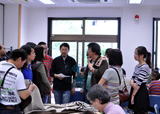 |
Visited Ainu cultural centers and national parks to understand the cultural significance of ecosystems in Hokkaido. Students also examined the state of hydroelectric dam in Nibutani, which affected several culturally significant sites and Ainu rights. In Sapporo, they observed one the oldest Ainu embroidery classes in Japan. Report (June 2011, Hokkaido) |
| February/2011 | Beppu (Oita) | Visited waste water treatment and biomass energy collection facilities to seek for feasible models in establishing recycle-oriented society that may produce food packaging materials and fuels from wastes. Students observed current Japanese recycling technology. Organized in collaboration with the Waste Management Expert Course (G30). |
| November/2010 | Okinawa Mainisland | Visited the mangrove forest, water treatment facilities, and other places in the main island of Okinawa to understand traditional culture and ecosystems. They visited museums and World Heritage sites to learn about the history of Okinawa. |
| December/2010 | Minamata (Kumamoto) | Visited a Minamata disease research institution to learn about the history of methyl mercury poisoning, which have affected fishermen and women since the 1950. Organized in collaboration with the Environmental Diplomatic Leader (EDL) education program. |
| December/2010 | Kita Kyushu Eco-Town (Fukuoka) | Visited the Eco Town to examine technical innovations for recycling home appliances, pet bottles, and cans. Organized in collaboration with the Waste Management Expert Course (G30). |
| October-November/2010 | Mongolia | As part of the international internship of the Environmental Diplomatic Leader (EDL) education program, students visited several places to learn about ecosystems and history. Students also made presentations about their research topics. |
| October/2010 | Nagoya | Participated in international workshops on REDD, which was organized as side events for the COP10 of the Convention on Biological Diversity. |
| July/2010 | Tunisia | Students joined the international internship of the Environmental Diplomatic Leader (EDL) education program to understand water and public health issues in Tunisia. |
| March/2010 | Shimoda (Shizuoka) | Aimed to study the marine ecosystem. Students collected planktons in by and outer sea to find out regional characteristics of biological diversity in the ocean. They discussed the issues related to dolphin fishing and capture for dolphinarium. They also observed environmental education at the Marine Research Center that were conducted by University of Tsukuba researchers in collaboration with local NGO. |
2. Theses
2022
- NGO THI LAN PHUONG “Optimization of Integrated Domestic Solid Waste Management: Geographic Information System and Life Cycle Assessment Based Scenario Design in Hanoi City, Vietnam “ (統合的家庭固形廃棄物管理の最適化 : ベトナム・ハノイ市における地理情報システムとライフサイクルアセスメントに基づくシナリオデザイン)
- Phan Cao Duong “Study of Dynamic Process of Land Use Land Cover Changes in Vietnam “ (ベトナムにおける土地利用・土地被覆の変動過程に関する研究)
- Bui Anh Huy “Coastal Erosion Detection by Remote Sensing and GIS in the North of Vietnam “ (リモートセンシングとGISによるベトナム北部海岸侵食の検出)
- Hoang Hanh Thi My “Social and Economic Impacts of Payment for Forest Environmental Services Policy on Individuals Service Providers in Quang Tri Province, Central Vietnam “ (ベトナム中央部クアンチ省における森林環境サービス支払制度が個人サービス提供者に与える社会経済的影響)
- Le Hien Thu “The El Niño Southern Oscillation and the Increasing Trend of Typhoon from 1990 to 2020 in Vietnam “ (エルニーニョ南方振動とベトナムにおける1990年から2020年にかけての台風の増加傾向)
- Nguyen Anh Thi Mai “Willingness to Pay for Marine Ecosystems Conservation in the Context of Tourism Development in Cat Ba Islands, Vietnam “ (ベトナム・カットバ島観光振興における海洋生態系保全に対する支払意思額)
- Nguyen Dieu Thi Huyen “Influence of Durian Intercropping on Chemical Properties of Soil under Coffee Farm in Krong Pak District, DakLak Province, Vietnam “ (ベトナムDakLak州Krong Pak地区におけるコーヒー農園下の土壌の化学性に及ぼすドリアン間作の影響)
- Tran Thao Thi Thanh “Comparison of Granular Stability and Nutrient Removal from Swine Wastewater between Two Types of Aerobic Granular Sludge Systems “ (二種類の好気性グラニュラー汚泥システムにおけるグラニュラー安定性と養豚排水からの栄養塩除去性能の比較)
2021
- Huynh Vy Thi Bao “Willingness to Pay for World Heritage Site Conservation in the Context of Flooding: A Case Study of Hoi An Ancient Town, Vietnam“ (洪水災害に係る世界遺産保全に対する支払意思額:ベトナム・ホイアン旧市街を事例に)
- Nguyen Bach Van “Effect of Salinity on Cr(VI) Bioremediation by Algal-bacterial Aerobic Granular Sludge Treating Synthetic Wastewater“ (合成廃水を処理する藻類-細菌好気性グラニュール汚泥におけるCr(VI)バイオレメディエーションに対する塩分の影響)
- Nguyen Cuong Van “Life Cycle Assessment of Alternative Technologies for Municipal Solid Waste Mangement in Hai Phong, Vietnam“ (ベトナム、ハイフォンにおける都市廃棄物管理のための代替技術のライフサイクルアセスメント)
- NGUYEN HUU QUANG “Space Syntax Analysis as an Urban and Rural Planning Pre-processing Tool : Case Study in Long Bien District in Hanoi, Vietnam“ (都市農村計画のプリ・プロセッシングツールとしてのスペースシンタックス分析手法についての研究~ベトナムのロング・ビエン区、ハノイ市を事例として~)
- Vu Thuy Thi Phuong “Mapping the Mangrove Dynamics in Three Provinces, Vietnam Using Landsat Time-series between 1990-2020“ (1990 年から 2020 年までの Landsat 時系列を使用したベトナムの 3 つの州のマングローブの動態のマッピング)
2020
- TANG QUYNH ANH “Application of Simulation Analysis in Selecting Greenhouse Gas Reduction Options: A Case Study of Viet Nam“ (シミュレーション分析を用いた温室効果ガス削減策の選択―ベトナムにおけるケーススタディ―)
- TRINH DINH DUY “Impact Assessment of Climate Change on Irrigation Water Requirements for Agriculture in the Ma River Basin in Thanh Hoa Province in Viet Nam“ (ベトナム・タインホア省マー川流域における農業用灌漑水要求量に対する気候変動の影響評価)
- PHAM BAO LONG “Urban Flood: Apply Design Rainfalls to Evaluate the Capacity of the Drainage System in Cau Giay District in Hanoi, Vietnam“
(都市洪水: ベトナムのハノイ市カウジャイ地区における排水システム能力を評価するための人工降雨の適用)
2019
- HOANG DUONG “Evaluation of Municipal Solid Waste Management in Ha Long bay: Scenario Application Analysis based on Life Cycle Assessment Approach”
- NGUYEN QUANG DUC “Impact of Food to Microorganisms Ratio on Bacterial Aerobic Granular Sludge and Algal-bacterial Granular Sludge Systems: Comparison on Performance and Granular Stability”
- TRUONG VAN THINH “Mapping Annual Forest Cover for Vietnam during 2015-2018 Using PALSAR-2 and Ancillary Data”
- VO HOANG HA “Climate Change Awareness and Adaptation: A Case Study of Smallholder Farmers in the Coastal Area of Phu Vang District, Vietnam”
2018
- DUONG THAI BANG “Characteristic of Suspended Sediment and Flow in Downstream of Mekong River, Southern Vietnam”
- HO THI HANG “Effect of Nanobubble Water on Anaerobic Methane Fermentation of Lignin”
- NGUYEN HONG VAN “Investigating Characteristics of Salinity Intrusion in the Mekong Delta”
- PHAN CAO DUONG “Analysis of Land Cover Changes in Central Vietnam Using High Resolution Multi-spectral-temporal Remotely Sensed Data”
- TA HOANG TRUNG “Land Cover Change Mapping in Southern Vietnam Using Multi-temporal High-resolution Satellite Remote Sensing Data”
2017
- Vu Van Nam “Evaluation of Municipal Solid Waste Management in Hanoi: Scenario Analysis Based on Life Cycle Assessment Approach”
- Tran Thi Loi “Changes in Fishery Circumstances and Livelihood Options, and Local People's Perceptions of Resource Conservation in Xuan Thuy National Park, Vietnam”
- Chu Minh Thu “Evaluating Drought Indices for Agricultural Drought Monitoring in Gia Lai Province, Vietnam”
- Le Viet Minh “A Study of Drought Management for Ben Tre Province in the Mekong Delta, Vietnam”
2016
- Nguyen Tu Minh “Study on Using Granular Sludge Sequencing Batch Reactor to Treat Synthetic Wastewater from Shrimp Cultivation”
- Pham Thuy Duong “Current Situation and Feasibility Analysis of Rice Straw Management in Vietnam”
- Hoang Thanh Tung “Analysis of Land Cover Change in Northern Vietnam Using High Resolution Remote Sensing Data”
- Hoang Phan Bich Ngoc “Impacts of Forestland Allocation Policy on Forest Resource Utilization and Livelihoods of Local People in Le Thuy District, Vietnam”
2015
- Nguyen Thi Ngoc Mai “Assessing the Co-benefits of Clean Development Mechanism Project in Municipal Solid Waste Landfills in Vietnam”
- Hoang Trung Thanh “Climate Change Mitigation Potential in the Solid Waste Management Sector in Developing Countries: Case Study in Hanoi Capital City, Vietnam”
- Le Hoang Anh “Hydrological Environment of Surface Water and Groundwater in Ninh Thuan Province, South-east, Vietnam”
- Nguyen Thu Thuy “Economic Assessment of GHG Emission Reduction Options for Rice Cultivation in Vietnam and Farmers' Perceptions toward the Options”
- Nguyen Thu Thuy “Hydrological Characteristics of Surface Water and Groundwater in Hanoi Capital City, Vietnam”
2014
- Vo Thi Thu “Applicability of Community-based Forest Management to Mangrove Forests in Xuan Thuy National Park, Viet Nam, and Its Effects on Local People's Perceptions on the Conservation”
- Nguyen Thi Tam “Perceptions of the Local People toward Small-scale Mangrove Conservation in Viet Nam: Two Cases in Thua Thien Hue Province”
- Tran Dang An “Groundwater Flow System at Coastal Region of Soc Trang Province, Southern Vietnam”
- Pham Thi Thanh “Potential of MODIS EVI Time Series Datasets to Support REDD+”
- Bui Thi Tuyet Van “Groundwater Flow System in Binh Chanh district, Ho Chi Minh City, Vietnam”
- LE KHANH LY “Study on the Thermal Environment and Residents' Behavior in the Courtyards of Traditional Tube Houses in Hanoi, Vietnam”
2013
- VU, Van Minh “Assessment of the Impacts of Climate Change on Water Allocation in the Upper Cau River Basin-Vietnam”
- NGUYEN, Thi My Quynh “Mapping of Soil Erosion in the Binh Dien Reservoir Watershed using the RUSLE Model in GIS and Remote Sensing”
- HA, Nam Thang “Seagrass Mapping Using ALOS AVNIR-2 Data in Lap An Lagoon, Vietnam”
- DANG, Nguyet Anh “Economic Valuation of the Nha Trang Bay Marine Protected Area(MPA) : A Willingness to Pay Survey for MPA Conservation Programs”
- NGUYEN, Tu Anh “Policy Options for REDD+ Implementation and Enhancing the Participation of Local People in Ba Be National Park, Bac Kan Province, Viet Nam”
- DAO, Minh Khue “Sustainable Management of Wastewater emitted by Paper Making Activities in Phong Khe Craft Village, Bac Ninh Province, Vietnam”
2012
- Pham, Tien Dat “Mangrove Area Change Analysis for Coastal Environmental Management in Hai Phong city, Vietnam using Remote Sensing and GIS.”
- Nguyen, Thi Thuy Phuong “The Effect of Forest Management by Local People to Forest Resource and Local Livelihood in Nam Dong district, Thua Thien Hue province, Viet Nam.”
- Ngo, Thi Lan Phuong “A New Approach to Municipal Solid Waste Governance based on a Sound Material - Cycle Society Initiative in Hanoi, Vietnam.”
- Nguyen, Thanh Nga “Estimation of Direct Use Values of Wetlands: A Case Study of Xuan Thuy National Park, Ramsar Site, Viet Nam.”
- Hoang, Thanh Tung “Policy for Risk Management in the Rice Value Chain to Adapt with Climate Change in Vietnam.”
2011
- Nguyen, Trung Thuan “Pollution Control Policy for Wastewater in Hanoi City, Vietnam.”
- Nguyen, Thi Thanh Huong “Establishing the Municipal Solid Waste Management in Hochiminh City, Vietnam.”
- Nguyen, Van Tra “Study on the Influence of Urban Growth to Agricultural lands in the Peri-urban of Hanoi City.”
2010
- Duong, Van Thang “Identification and Characterization of Oil Producing Algae in Vietnam Sea.”
- Nguyen, Tien Phuc “An Evaluation on 3R Efficiency for Comprehensive Waste Management and Treatment Systems in Hanoi, Vietnam.”
3. Message from Past JDS Fellow
|
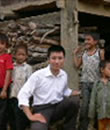 |
Quite contrary to the image I previously had about the University of Tsukuba as part of the science (fictional?) city, I found the campus quite green and peaceful when I first arrived there in July 2008. I could concentrate on my study and relax after hard work at my Lab. It is very convenient to travel from Tsukuba to central Tokyo. It takes only 45 minutes by TX express train.
During two-year study at the Graduate School of Life and Environmental Sciences, the University of Tsukuba, I not only made much academic progress, but also gained my spiritual and mental maturity, thanks to my esteemed professors, and my international and Japanese friends.
Regarding my research, my academic supervisor gave me proper instruction for making seminar presentation and refining research. I also received instructions for collecting and analyzing data so that I could develop a new model for my thesis. Appointments with supervisors for research consultation were conducted weekly without delay. In addition, I had a chance to make presentations about my research at conferences and to receive comments from professors and young scientists nationwide.
Through course work, I gained interdisciplinary knowledge about environmental sciences both in theory and practice. I could learn how to make presentation and write scientific papers with self-confidence. I also had field trips to different places, including factories and institutes in Japan.
Human networking is also one of important components for international students. We would encourage each other while we are away from our home countries. I received kind support from my international and Japanese friends, and, in turn, learned about their cultures and customs.
I also would like to thank proper orientation and support JICE personnel and professors at the University of Tsukuba provided. In short, I feel right that I chose the University of Tsukuba for my Master’s. The University has established G30 programs and the EDL program recently to encourage international students to study. I wish I could be part of the University community again. I am very proud to be an alumnus of the University.
Currently I provide professional services for local and international experts on environmental issues, including integrated solid waste management in Ha Noi and Hai Phong cities as well as in other provinces. I also served for water supply projects in remote and poor areas of the country (Lang Son, Lao Cai, Son La, Dien Bien, Thanh Hoa, Quang Ngai, etc). These projects aimed to strengthen the institutional framework by enhancing the human capacity.








